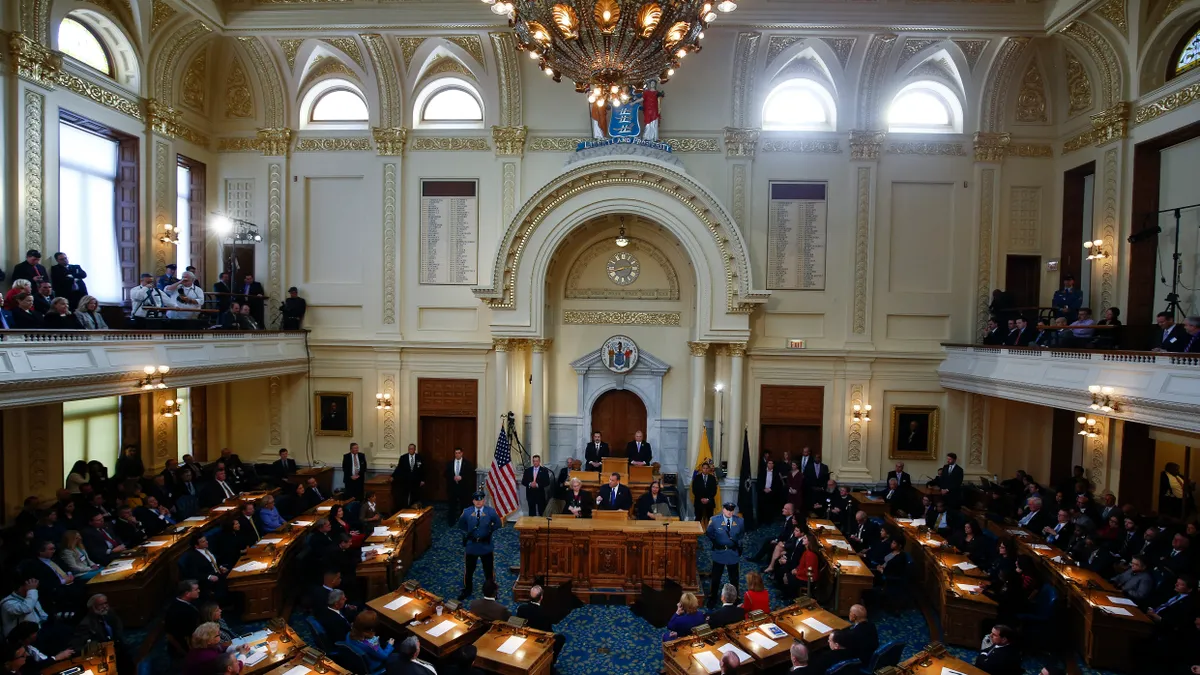Dive Brief:
- New Jersey maintained its rank as the state that imposes the most burdensome business taxes, with New York and California following in 49th and 48th place, respectively, the Tax Foundation said in a report.
- New Jersey and other “states in the bottom 10 tend to have a number of afflictions in common: complex, non-neutral taxes with comparatively high rates,” the Tax Foundation said. The organization weighs five factors when ranking states, including individual income tax, sales tax, corporate income tax, property tax and unemployment insurance tax.
- Wyoming business taxation is the least onerous thanks to its top rank in both corporate taxation and individual income tax, according to the Tax Foundation’s 2023 State Business Tax Climate Index. The Cowboy State has held the No. 1 spot since 2014. South Dakota and Alaska rank second and third, respectively.
Dive Insight:
Although every state levies a property tax and unemployment insurance tax, several states forgo a corporate income tax, individual income tax or sales tax, the Tax Foundation said. Wyoming, Nevada and South Dakota impose neither a corporate tax nor an individual income tax, while Alaska has no individual income or sales tax.
“The evidence shows that states with the best tax systems will be the most competitive at attracting new businesses and most effective at generating economic and employment growth,” the Tax Foundation said, adding that “changes to the tax code can quickly improve a state’s business climate.”
New Jersey’s “tax climate” is especially hostile to businesses, the Tax Foundation said. The Garden State “is hampered by some of the highest property tax burdens in the country, has the highest-rate corporate income taxes in the country and has one of the highest-rate individual income taxes.”
“Additionally, the state has a particularly aggressive treatment of international income, levies an inheritance tax and maintains some of the nation’s worst-structured individual income taxes,” the Tax Foundation said. New Jersey has held the lowest rank for business taxation since 2018.
State taxes influence business decisions, plant location, competitiveness, job creation and retention, the transparency of the tax system and a state’s long-term economic health, the Tax Foundation said. Onerous taxes undercut profits, thereby crimping shareholder returns, prompting lower wages or fewer job openings, and increasing pressure to raise prices for consumers.
High-tax states often lose out to peers with lower taxes and less complicated tax structures, the Tax Foundation said.
“Even in our global economy, states’ stiffest competition often comes from other states,” the organization said. “Most mass job relocations are from one U.S. state to another rather than to a foreign location.”
“State lawmakers must be aware of how their states’ business climates match up against their immediate neighbors and to other regional competitor states,” the Tax Foundation said.
Several states improved their tax rank for 2023. Arizona jumped to 19th from 24th by moving to a two-bracket individual income tax with a top rate of 2.98% from a four-bracket system with a top rate of 4.5%, the Tax Foundation said.
Idaho climbed to 15th from 17th by cutting both the individual income tax top rate and the corporate income tax flat rate to 6% from 6.5%, the organization said.












